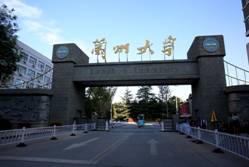
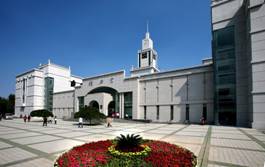
LANZHOU UNIVERSITY
Lanzhou University (LZU) is one of the key national universities administered directly by the Ministry of Education under China’s "Project 985" and "Project 211". In 2017, LZU was listed as one of the "Double First-Class" universities, with an “A-class” ranking. The history of LZU traces back to the Gansu Law and Politics School, founded in 1909. In 1928 the school was promoted to "Lanzhou Sun Yat-en University", which was renamed in 1945 to "State Lanzhou University". After 1949, the name of LZU is used,it developed and grew rapidly and was listed in 1952 as one of the fourteen key comprehensive universities in China. In 2002 and 2004, the former Gansu Grassland Ecological Institute and Lanzhou Medical School were both merged into LZU, respectively. In the last 40 years, LZU has established itself as one of the top universities of China by seizing historical opportunities and sticking to the national policy of rejuvenating the nation through education and talents.
With almost 20,000 undergraduate and over 10,000 postgraduate students, LZU has a long history of excellence in biology, chemistry, geology, mathematics and physics. It also excels in various unique disciplines and research areas based on the regional resources and culture of northwestern China, as seen in the following programs: Central Asian studies, Dunhuang studies, dry-land ecology, sand fluid dynamics, Tibetan and Loess Plateau sciences, and grassland agriculture. This has greatly contributed to the local economic and social development as well as to the country as a whole.
The School of Physical Science and Technology


Overview
The School of Physical Science and Technology at LZU was established in 1998 based on two former departments, namely, the Department of Physics, founded in 1946, and the Department of Material Science, established in 1984. It was one of the first universities granted by the Academic Degrees Committee of the State Council to offer bachelor’s, master’s and PhD degrees as well as a center for post-doctoral studies in physics (1980's and 1990's), material science and engineering (1980's and 2010's). Particle physics and nuclear physics are state key disciplines. Physics, material physics, chemistry as well as microelectronics and solid state electronics are, in addition, key disciplines of the Gansu province. The physics and material science and engineering have ranked in the top 1% of worldwide in 2009 according to Essential Science Indicators(ESI), have become internationally highly ranked disciplines.
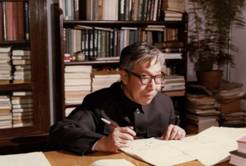
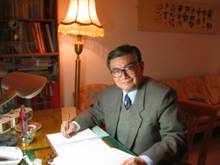
Left: Professor Gong-Ou Xu at work;Right:Professor Yi-Shi Duan at work
Faculty
The School of Physical Science and Technology has 38 professors, 68 associate professors, 38 lecturers as well as 25 engineers or technicians. Among the faculty members, one is a member of the Academic Degrees Committee of the State Council, one was awarded the national "1000 Program" with “B-class”, three faculty members were winners of the "Chang-Jiang Scholar Award Project" issued by the Ministry of Education of China, three faculty members were awarded “National Funds for Distinguished Young Scientists”, and four faculty members were awarded “National Funds for Excellent Young Scientists. The school has one full-time professor and one full-time associate professor from Germany and France, respectively.
Disciplines and Education Platforms
The school has three first-level disciplines, namely, physics, material science & engineering as well as electronic science and technology, and two centers for post-doctoral studies in physics and material science and engineering, respectively. The school offers PhD degrees in theoretical physics, condensed matter physics, material physics, chemistry, microelectronics and solid state electronics (second-level disciplines). The school also offers master’s degrees in microelectronics, material science and engineering (first-level disciplines) and in theoretical physics, condensed matter physics, material physics & chemistry, microelectronics and solid state electronics, optics, and material science (second-level disciplines). Finally the school offers bachelor’s degrees in basic physics, material physics & chemistry, microelectronics and engineering.
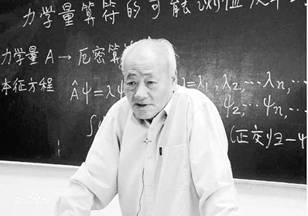
Professor Bo-Chu Qian at teaching
The school has various talent-training platforms such as the National Base for Science Research and Education, the National Experimental Teaching Demonstration Center, and the Cui-Ying Class of Physics under the “Test Plan of Top-Notch Students Training in Basic Disciplines". It also has two key laboratories of the Ministry of Education, namely, a laboratory for magnetics & magnetic materials and a laboratory for special functional materials & structural design. The some of the school’s other laboratories and/or centers include the associated engineering laboratory of light conversion materials and technology, the test and analysis platform for large scientific instruments in physics and information material, the theoretical physics exchange platform, the laboratory of advanced functional materials, the hadron and CSR physics research center, the joint research center for computation and complexity, and the magnetic materials joint research and development laboratory.
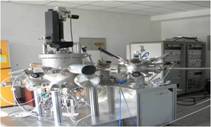
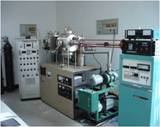
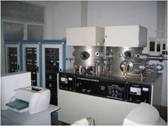
Experimental Equipment and Instrumentation
With an area of 15,000 square meters for offices, teaching and scientific experiments, the school offers excellent study and working conditions. Among the nearly 8,000 scientific instruments and apparatuses, the school has about 70 pieces of advanced equipment such as a transmission electron microscope, a field emission scanning electron microscope, a superconducting quantum interference magnetometer, an NMR spectrometer, a micro-Raman spectrometer, an ultraviolet visible fluorescence spectrometer, and a vibrating sample magnetometer.
Teaching and Research Achievements
Numerous teaching achievements were rewarded by national prizes, and the disciplines of physics and material chemistry were awarded with the title of “National Key Disciplines for Higher Learning Institutions” by the Ministry of Education in China. The school boasts six “National Great Courses” and “Excellent Base Courses of Science”, which include thermodynamics and statistical physics, quantum mechanics, the selection and analysis of exercises in quantum mechanics, and quantum field theory. In recent years, 42 prizes in teaching and 13 prizes in course books were won by members of the school.
The school provides a solid foundation in the study of mathematical physics, particle physics, general relativity, condensed matter physics, magnetic recording and high performance magnetic materials, local magnetism, physics and materials of semiconductor thin films, structural and functional metal materials, nanoscale and low dimensional materials, etc. We have developed special research on areas that include microstructures and properties of low dimensional magnetic materials; electronic and photon information materials; the exploration of new functional materials; and environmental materials, design and manufacture. The faculty has undertaken national key research projects such as the National Scientific Research Plan, the "973 Project", "863 Project", the National Natural Science Fund Project,as well as local and provincial projects. Faculty members of the school have published works in renowned peer-reviewed international journals such as Nature, Physical Review Letters, etc.
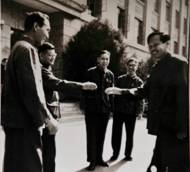
Professor C.-N. Yang visited LZU in 1970's
International Academic Exchange
Many outstanding experts and scholars have been invited to visit the school, including Nobel laureates such as Chen-Ning Yang, Tsung-Dao Lee, Rudolf Ludwig Mossbauer, Samuel Chao Chung Ting, David Gross, Heinrich Rohrer, Douglas D. Sheriff. The school annually sends 10 or so teachers to USA, UK, Germany, etc, for further training and/or for exchange programs . In addition, the school has organized conferences such as the "Sixth Joint Meeting of Chinese Physicists Worldwide", the "German-China Bilateral Forum on Frontiers of Nanotechnology and Nano-standardization", the "International Conference on Rare Earth Development and Application". Furthermore, the school is involved in international cooperation with countries like the UK, USA, Germany, France, Poland, Japan, Russia, Canada and Singapore in diverse research areas and the school has won a high reputation around the world.






